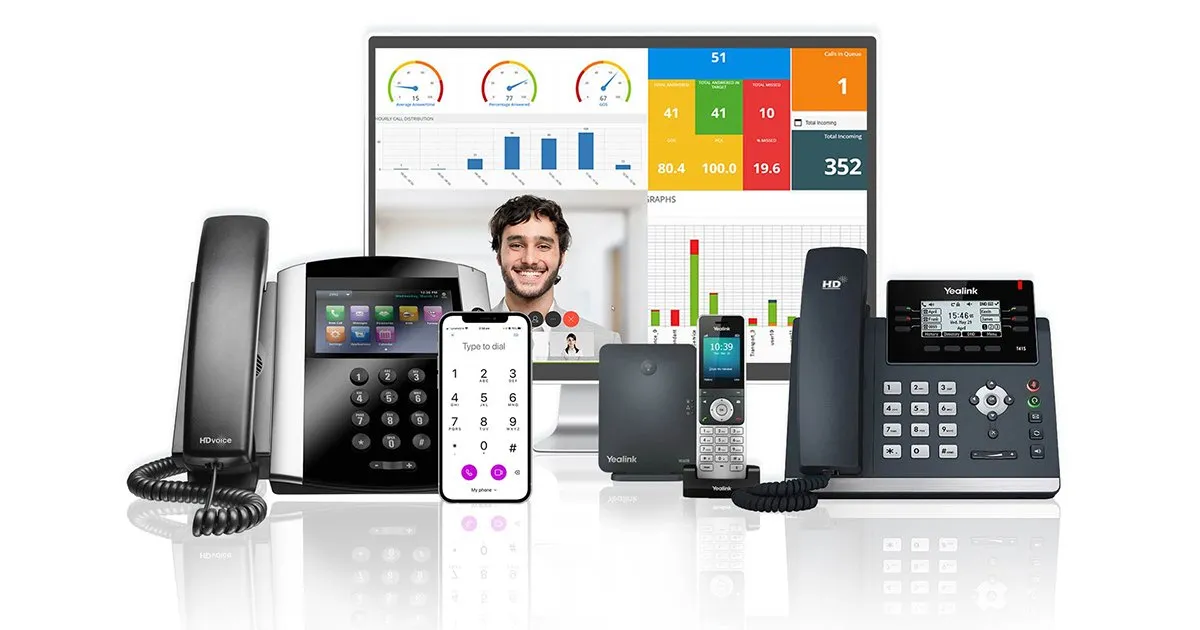Voice over Internet Protocol (VoIP) has transformed the way businesses interact with their customers, making communications more seamless and convenient. Despite its numerous advantages, several misconceptions about VoIP persist. This blog post aims to dispel these myths, providing clarity on the true benefits of VoIP systems.
What is VoIP?
VoIP is an online communication tool that handles inbound and outbound calls over the Internet. It converts analog voice signals into digital data packets and transmits them via the Internet through your VoIP provider. With features like call recording, monitoring, and call redirection, VoIP enhances business communications and boosts productivity.
Common Myths About VoIP
Myth 1: VoIP is Expensive
Reality: VoIP can be a very cost-effective phone system for businesses of all sizes. Unlike traditional phone systems, VoIP eliminates the need for expensive hardware and telephone lines. With the right setup and plan, businesses can save up to 50% on their monthly telephone bills. VoIP relies on the Internet to transmit calls, meaning you don’t have to pay for expensive landlines and long-term contracts with phone companies.
Myth 2: VoIP is Not Reliable
Reality: Modern VoIP systems are designed to be reliable even in areas with poor or no reliable internet connection. The advancement of technology and high-speed internet connections have made VoIP just as reliable as traditional phone services. Many VoIP providers offer redundancy and failover solutions to ensure continuous service.
Myth 3: VoIP is Not Secure
Reality: VoIP technology can be just as secure as traditional phone lines if proper security measures are taken. VoIP systems use the same encryption protocols as other forms of digital communication, such as web browsers, to prevent outside listeners from hijacking your phone system. Implementing strong passwords, regular updates, and secure networks can further enhance VoIP security.
Myth 4: VoIP is Only Ideal for Big Businesses
Reality: VoIP systems are very modular and flexible, making them suitable for businesses of all sizes, including small and midsized businesses (SMBs). VoIP networks are structured with growth and expansion in mind, offering efficiency, cost-effectiveness, and customizable toolsets that are perfect for SMBs.
Myth 5: VoIP Voice Quality is Substandard
Reality: VoIP voice quality has significantly improved with advancements in technology. Today, VoIP calls can offer crystal-clear voice quality, often surpassing that of traditional phone lines. Factors such as a stable internet connection and quality VoIP hardware contribute to optimal voice quality.
Myth 6: VoIP is Difficult to Install and Manage
Reality: Setting up a VoIP system can be quick and easy, usually taking just a few hours. Many VoIP handsets come with pre-packaged solutions that include everything you need in one convenient package. User-friendly features such as self-guided installation instructions, intuitive web interfaces for customizing settings, and automated monitoring tools make managing a VoIP system straightforward.
Myth 7: You Cannot Transfer Your Old Number to VoIP
Reality: Most VoIP providers offer number portability, allowing you to keep your existing phone numbers when switching to a VoIP system. This feature ensures a smooth transition without disrupting your business operations or customer communications.
Myth 8: You Have to Update All Hardware When Switching to VoIP
Reality: VoIP systems are highly compatible with existing hardware. Many VoIP solutions work with traditional phones using an adapter, allowing businesses to switch to VoIP without replacing all their hardware. This compatibility reduces initial setup costs and simplifies the transition process.
Myth 9: Most Businesses Do Not Use VoIP
Reality: VoIP adoption is widespread among businesses of all sizes. Many companies have already made the switch to VoIP due to its cost-effectiveness, flexibility, and advanced features. The growing trend towards remote work and global collaboration further drives the adoption of VoIP systems.
How VoIP Can Benefit Your Business
Cost Savings: VoIP significantly reduces communication costs, eliminating the need for expensive hardware and long-distance charges.
Enhanced Productivity: Features like call forwarding, voicemail to email, and mobile integration ensure employees can work efficiently from anywhere.
Scalability: VoIP systems can easily scale up or down based on your business needs, making them ideal for growing businesses.
Improved Collaboration: VoIP facilitates seamless collaboration through voice, video, and web conferencing, enhancing team communication and productivity.
Professional Call Handling: VoIP systems offer professional features like automated attendants, call queuing, and custom greetings, projecting a professional image to your customers.
Conclusion
VoIP systems offer numerous benefits that can transform business communications. By debunking common misconceptions, it becomes clear that VoIP is a reliable, secure, and cost-effective solution suitable for businesses of all sizes. Embracing VoIP technology can enhance productivity, improve collaboration, and provide a professional image for your business.



